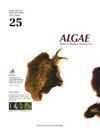亚临界水提取尾藤可减少脂质积累和肥胖引起的炎症
IF 2.4
3区 生物学
Q1 MARINE & FRESHWATER BIOLOGY
引用次数: 1
摘要
肥胖引起的炎症在胰岛素抵抗和2型糖尿病的发病机制中至关重要。在本研究中,我们在细胞模型(3T3-L1脂肪细胞和RAW 264.7巨噬细胞)中研究了根草(GC)对脂质积累和肥胖诱导的炎症变化或葡萄糖稳态的影响。GC样品分别在不同温度(90、150、210℃)下使用溶剂(水、甲醇、乙醇)和亚临界水(SW)进行提取。210°C时GCSW提取物(GCSW210)的总酚含量最高,且GCSW210能有效抑制脂质积累,显著降低3T3-L1脂肪细胞中过氧化物酶体增殖激活受体-γ、CCAAT/增强子结合蛋白-α、固醇调节元件结合蛋白-1c和脂肪酸合成酶的基因表达。此外,GCSW210有效下调RAW 264.7巨噬细胞中促炎细胞因子调控通路,包括丝裂原活化蛋白激酶、转录信号转导和激活因子、核因子-κB。在3T3-L1脂肪细胞和RAW 264.7巨噬细胞共培养中,GCSW210显著降低一氧化氮生成和白细胞介素-6水平,并以剂量依赖的方式改善葡萄糖摄取。这些发现表明,GCSW210通过减轻肥胖引起的脂肪细胞炎症来改善葡萄糖代谢,这可能被用作治疗肥胖和相关代谢疾病的可能治疗选择。本文章由计算机程序翻译,如有差异,请以英文原文为准。
Subcritical water extraction of Gracilaria chorda abbreviates lipid accumulation and obesity-induced inflammation
Obesity-induced inflammation is crucial in the pathogenesis of insulin resistance and type 2 diabetes. In this study, we investigated the effects of the Gracilaria chorda (GC) on lipid accumulation and obesity-induced inflammatory changes or glucose homeostasis in cell models (3T3-L1 adipocytes and RAW 264.7 macrophages). Samples of GC were extracted using solvents (water, methanol, and ethanol) and subcritical water (SW) at different temperatures (90, 150, and 210°C). The total phenolic content of GCSW extract at 210°C (GCSW210) showed the highest content compared to others, and GCSW210 highly inhibited lipid accumulation and significantly reduced gene expressions of peroxisome proliferatoractivated receptor-γ, CCAAT/enhancer-binding protein-α, sterol regulatory element-binding protein-1c, and fatty acid synthase in 3T3-L1 adipocytes. In addition, GCSW210 effectively downregulated the pro-inflammatory cytokine regulator pathways in RAW 264.7 macrophages, including mitogen-activated protein kinase, signal transducers and activators of transcription and nuclear factor-κB. In co-culture of 3T3-L1 adipocytes and RAW 264.7 macrophages, GCSW210 significantly reduced nitric oxide production and interleukin-6 levels, and improved glucose uptake with dose-dependent manner. These findings suggest that GCSW210 improves glucose metabolism by attenuating obesity-induced inflammation in adipocytes, which may be used as a possible treatment option for managing obesity and associated metabolic disorders.
求助全文
通过发布文献求助,成功后即可免费获取论文全文。
去求助
来源期刊

Algae
PLANT SCIENCES-
CiteScore
5.10
自引率
25.00%
发文量
18
期刊介绍:
ALGAE is published by the Korean Society of Phycology and provides prompt publication of original works on phycology. ALGAE publishes articles on all aspects of phylogenetics and taxonomy, ecology and population biology, physiology and biochemistry, cell and molecular biology, and biotechnology and applied phycology. Checklists or equivalent manu-scripts may be considered for publication only if they contribute original information on taxonomy (e.g., new combinations), ecology or biogeography of more than just local relevance. Contributions may take the form of Original Research Articles, Research Notes, Review Articles and Book Reviews.
 求助内容:
求助内容: 应助结果提醒方式:
应助结果提醒方式:


